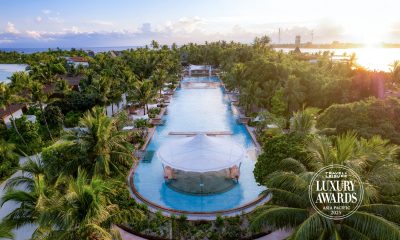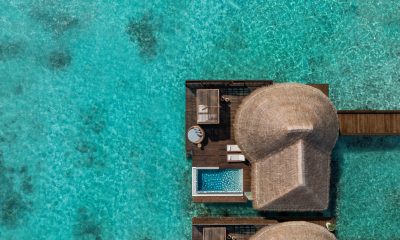Action
W Maldives collaborates with Puma Middle East to host exciting FUEL happening

Fitness lovers will be able to take part in an exciting weekend of activities from 18th– 20th of March 2022 at W Maldives as the luxury resort partners with global sports brand, PUMA. The collaboration will promote W Maldives’ ‘FUEL Your Escape’ package and PUMA’s global ‘She Moves Us’ campaign.
The FUEL Happening invites guests to DETOX. RETOX. REPEAT. and will see classes including sunrise and sunset yoga and Pilates take centre stage alongside action-packed and adrenaline-filled watersports activities and a Full Moon Music Glow Yoga session at the resort’s very own castaway island, Gaathafushi. These activities are specially curated for the event to make fitness fun and inspire guests to move more.
Part of PUMA’s global ‘She Moves Us’ campaign, to focus on its top female sports ambassadors, celebrating the women who have moved sports forward to inspire other women around the world, the FUEL Happening will bring some of the region’s most popular female influencers to the resort to get the fitness party pumping. PUMA will also be promoting their PUMA STUDIO Collection, a fashion-meets-function line featuring the latest in style and technology — from core-baring tanks and high-waisted leggings to wicking fabrics and comfort-first cuts. Plus, every piece contains at least 25% recycled material.
The luxury playground at W Maldives is the perfect place to either restart that healthy regime or kick it off, with the FUEL Happening blending a party atmosphere with all the elements of wellbeing for body, mind and soul. The resort, which already offers a range of activities from high intensity boot camps to holistic treatments and nutrition support, will bring fitness to life with this high energy collaboration.
“PUMA is the ideal partner for us at W Maldives, in keeping with our brand philosophy that fitness and healthy living can be fun and social,” said Idu Ribeiro, General Manager W Maldives.
“The FUEL Happening is the perfect chance for fitness lovers or novices alike, to come and enjoy the tropical haven of the Maldives with a twist. Yes, guests can relax and revive on our beautiful island, but they can also come and be energised and explore the fun side of fitness.” He added.
PUMA has curated a variety of classes to appeal to all ages and abilities as it aims to inspire and encourage women to live a more active, energetic life.
FUEL is W’s passion and lifestyle, and a core element of every guests’ experience. W Maldives’ perfectly planned FUEL Your Escape package will definitely give people who work, play, and think differently, the excitement and balance they crave to leave them feeling energised to look good, feel good, go longer and stay later.
Action
Dive for free at Kandooma, just named Maldives’ leading dive resort

Holiday Inn Resort Kandooma Maldives has been crowned ‘Maldives Leading Dive Resort 2025’ at the prestigious World Travel Awards, marking a major milestone as the inaugural winner of this newly introduced category.
The announcement was made at a glittering gala ceremony held on 29 June in Tanzania, attended by tourism and hospitality leaders from across Africa and the Indian Ocean. The accolade honours Kandooma’s commitment to exceptional diving experiences and innovation in accessible underwater tourism.
“We’re surrounded by some of the most awe-inspiring marine life in the Maldives – it’s truly like diving in a living aquarium,” said Mark Eletr, General Manager of Holiday Inn Resort Kandooma Maldives. “From graceful manta rays and reef sharks to turtles, moray eels, and vast schools of tropical fish, our waters are teeming with life.”
Just minutes from the resort are world-class dive sites including Kandooma Thila, a renowned cleaning station for grey reef sharks; Guraidhoo Corner, famous for its strong currents and pelagic encounters; and Medhu Faru, where divers drift alongside vibrant coral walls. The close proximity of these sites allows for up to three dives a day – ideal for enthusiasts chasing underwater thrills.
Central to Kandooma’s diving success is its bold ‘Dive Free’ initiative – a game-changer for the scuba community. Guests who stay three nights or more and are certified divers receive two complimentary boat dives per day, including equipment and professional guidance.
“Diving can be an expensive pursuit, so we decided to flip the script,” Eletr added. “Our ‘Dive Free’ program removes the barriers and makes the underwater magic of the Maldives accessible to more people than ever.”
Kandooma’s on-site 5-star PADI dive centre offers courses for beginners through to advanced, specialty certifications and refreshers, as well as private excursions for underwater photography, night dives, and wreck explorations.
With its commitment to sustainability, marine preservation, and guest experience, Holiday Inn Resort Kandooma Maldives has proven that world-class diving doesn’t have to come with a luxury price tag – just a sense of adventure.
For more information or to book a diving escape, visit: www.maldives.holidayinnresorts.com
Action
Siyam World kicks off August with star-studded football camps

No shoes, no stress, just goals! This August, Siyam World Maldives is turning up the heat with not one, not two, but three football legends taking over the island for exclusive five-day Football Residence Camps – Wayne Bridge, Kean Bryan, Andrew Johnson.
Wayne Bridge | August 1–5
A former England international and Premier League left-back with over 300 top-flight appearances, Wayne is best known for his time at Chelsea, Manchester City, and Southampton. His elite-level experience, from Champions League nights to FA Cup triumphs, makes him the ultimate coach for young players looking to level up.
Kean Bryan | August 11–15
A midfield dynamo with a Premier League pedigree, Kean’s career includes spells at Manchester City, Sheffield United, and West Brom. Known for his technical skill and tactical brain, he brings a youth-focused approach packed with energy, precision, and motivation.
Andrew Johnson (AJ) | August 17–21
A former England striker and Crystal Palace legend, AJ lit up the Premier League with his pace and goal-scoring flair. His sessions will bring fast-paced drills, goal-scoring tips, and a whole lot of fun to the pitch.
Each 5-day camp for kids between 5 and 12 years, takes place on the resort’s own World Sports Arena, as part of their exclusive Football Residences programme, designed to inspire the next generation of football stars while having the time of their lives in paradise. Spots are limited, and trust us, they’ll go fast. Give your child the chance to train with football legends, make lifelong friends, and experience the magic of the Maldives—because this is one match they won’t want to miss.
Siyam World has already hosted some of the biggest names in football, with past camps featuring stars like: Francesco Totti, Alessandro Del Piero, Rio Ferdinand, Owen Hargreaves, Daniel Agger or Esteban Cambiasso. Joining this incredible lineup, those football legends in August are making Siyam World the go-to destination for football-obsessed kids and their families.
Action
Making waves all summer long: Manta rays, mini explorers take over The Standard, Huruvalhi Maldives

At The Standard, Huruvalhi Maldives, July isn’t just another sunny month – it’s when the ocean comes alive. Manta season is in full swing, and Hanifaru Bay (just a splash away from the resort) becomes host to hundreds of reef manta rays performing underwater ballet. Offering a front row seat to all the action is the resort’s Manta Ray Watching Experience package available through October 31.
Suitable for confident snorkelers aged 12+, the three-hour excursion includes roundtrip speedboat rides and all the ocean wonder you can handle. Located in the Baa Atoll UNESCO Biosphere Reserve, Hanifaru Bay’s shape works like a plankton magnet, drawing in marine life for one of the largest known manta feeding frenzies on the planet. As you float just meters above the action, graceful giants barrel rolling through plankton-rich waters in synchrony, with whale sharks making cameo appearances.
Beyond the waves
Kids under 12 are safe from FOMO with the return of the Summer Camp, running from July 1 to August 31. Creative energy gets channeled into arts, crafts, pottery and even directing resort-wide film shorts. Young adventurers can zen out in Lil’ Yogis, work out on the water with SUP, swing rackets with Tennis Titans or shake it off with Zumba. Mini chefs can dive into sushi, cupcake, pizza and mocktail workshops. And those craving star power can choose between karaoke showdowns and splashy pool parties. Language games and Maldivian drumming sessions sneak in a little learning with all that fun.
Family stays
Awarded the ‘Best Resort for Families’ by T+L Luxury Awards Asia Pacific 2023, The Standard Huruvalhi, Maldives makes finding family-friendly accommodation a breeze. Lagoon Overwater Villas are suspended above crystal-clear waters, Ocean Overwater Villas take you from bed straight to the house reef, and Beach Villas are perfect for private poolside moments in lush tropical greenery. Finally, multigenerational families will find just the right balance of privacy and togetherness at the sprawling
The Standard Residence.
Applicable for two adults and two kids below 12 years old (an additional charge of USD 285 per night applies to older kids), the ‘Families That Stay Together’ package includes accommodation in an overwater or beachfront villa, an All-Inclusive Plus Meal Plan, free water sports, laundry and spa credit. Over at Lil’ Shark Kids Club, youngsters dive into complimentary activities ranging from high-energy fun to creative pursuits – whether ruling the roost in the playroom, splashing in the paddling pool, digging into the sandy park or winding down in the movie den. Beyond daily adventures like cooking classes, babysitting services are also available for $35 per hour.
For more information on the Manta Ray Experience, priced at $250 per person, please click here. For the full summer camp programme, visit the link. To book your accommodation, please click here.
-

 Awards1 week ago
Awards1 week agoSirru Fen Fushi secures top spots in Travel + Leisure Luxury Awards 2025
-

 Featured1 week ago
Featured1 week agoKuda Villingili’s iconic pool honoured in Travel + Leisure Asia Pacific Awards
-

 Featured1 week ago
Featured1 week agoGlobal recognition for InterContinental Maldives Maamunagau Resort at 2025 T+L Luxury Awards
-

 Awards1 week ago
Awards1 week agoTravel + Leisure Asia Pacific awards Villa Nautica Best Resort Pool in Maldives
-

 Action1 week ago
Action1 week agoHideaway Beach Resort unveils new indoor pickleball court for wellness enthusiasts
-

 Featured1 week ago
Featured1 week agoElevated wellness: Aerial Yoga launches at Sun Siyam Olhuveli Maldives
-

 Featured1 week ago
Featured1 week agoSO/ Maldives unveils restorative wellness journey with Holistic Healer Karan Kumar
-

 Featured1 week ago
Featured1 week agoSun Siyam Iru Veli debuts Wellness in Motion Week with beach runs and expert-led yoga















